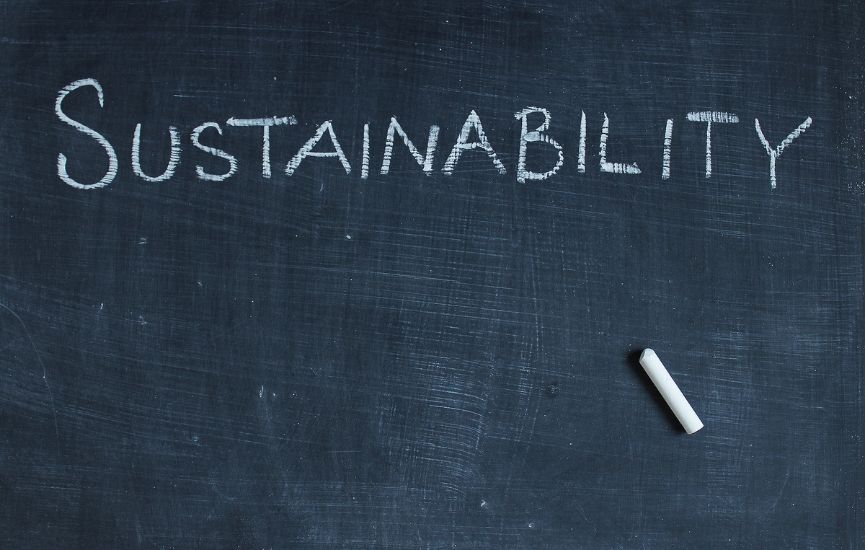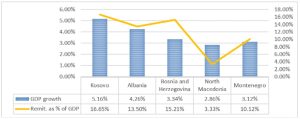Policy Recommendations
- Promote circular migration to ensure retransfer of know-how and human capital to the region.
- Reinforce the social dimension of the enlargement policy.
- Ensure a credible enlargement perspective to improve the social and economic development outlook.
Abstract
This Policy Brief claims that the socio-economic policy of the European Union (EU) towards the Western Balkans is not sustainable. Labour migration from the region to the EU-27 represents a double-edged sword for the Western Balkans. EU member states’ policies should align with the overall EU goal to promote social and economic development in the Western Balkans. Therefore, circular migration should be promoted to ensure retransfer of know-how and human capital. The social dimension of the enlargement policy should be strengthened to improve the working and living conditions in the region. Finally, a credible enlargement perspective should be ensured to improve the overall social and economic development outlook.
****************************
Making the EU and member states policy towards the Western Balkans socio-economically more sustainable
Introduction
The European Union’s (EU) enlargement policy towards the Western Balkans aims at promoting democratic reforms, good governance and economic transformation to support the countries in fulfilling the Copenhagen Criteria, as precondition for a future EU membership. This policy reflects the democratic values that are fundamental for the functioning and cohesion of the EU as a political system. However, the EU is also criticised for the primacy of its economic policy over its social dimension. This lack of social protective role of the EU contributes to an alienation of increasing segments of the European population that expect more social protection from the EU, although it remains in the competence of the member states. Readiness to vote for nationalist, populist and anti-democratic candidates in elections represents a substantial internal threat to the EU, as populist forces seek to reverse the EU integration process. Labour migration inside the EU and also from its neighbourhood such as the Western Balkans is portrayed as threat and competition on the job market. Seen from the Western Balkans, labour migration towards the EU member states is a double-edged sword, as the region on the one hand profits from substantial remittances, on the other hand suffers from severe human capital losses.[1] This Policy Brief claims that the socio-economic policy of the EU member states towards the Western Balkans is not long-term oriented and proposes policy shifts to make it more sustainable. EU member states and companies have their own economic interests, but member states’ policies should contribute to the overall EU goal to promote social and economic development in the Western Balkans.
Seen from the Western Balkans, labour migration towards the EU member states is a double-edged sword, as the region on the one hand profits from substantial remittances, on the other hand suffers from severe human capital losses.
EU’s socio-economic policy towards the Western Balkans – crisis driven dependency
Since the 1990s the Western Balkan countries have struggled to attain the level of social and economic development of the pre-war period. With the global financial crisis in 2007/2008 and the COVID-19 pandemic the region has been severely hit twice again. The Western Balkan region has made small gains towards economic convergence with the EU but not on a level that would offer its citizens significantly improved opportunities which is one of the main causes for emigration.[2] Forecasts indicate that at current growth rates, it would take sixty years for the average per capita income in the Western Balkans to converge with the EU average.[3] The EU has shown solidarity in view of the social and economic challenges in the region and has provided access to macro-financial assistance and investments with its Economic and Investment Plan.[4] However, in consequence of Russia’s war against Ukraine, a third economic and social crisis is swapping over the European continent including the Western Balkans. This is visible in increased inflation, higher energy costs and income losses due to an expected decrease of tourism from Ukraine and Russia.[5] The region is strongly dependent on the EU, and as was visible in previous crisis, the impact will correlate with the scale of the economic crisis within the EU. On the one hand, this dependency will increase with further economic integration of the region in the framework of the enlargement process. On the other hand, this approximation is currently not progressing as wished, causing political uncertainty and economic costs in the long run. A special case of this socio-economic interdependency is the labour migration between the region and the EU member states.
The region is strongly dependent on the EU, and as was visible in previous crisis, the impact will correlate with the scale of the economic crisis within the EU.
The case of labour migration – a win-win or losing deal for the Western Balkans?
In 2021, the EU received over 64.000 labour migrants from the Western Balkan region.[6] Labour migration between the Western Balkans and the EU is an example of mutual dependency, as on the one hand, it is based on a demand side from within the EU and its member states’ (companies) in various degrees. On the other side, there is a push-factor from youth, high skilled but also unemployed workers that seek to improve their living conditions by emigrating to the EU.[7] Germany has been an example of a labour market in need for qualified workers especially in the health care sector. The remittances of the diaspora significantly contribute to their home countries’ economies and households. In the period from 2005-2015, the Western Balkans received an average of USD 1460 million in remittances which have been shown to significantly impact economic growth.[8] The chart below shows the twenty-year average Gross Domestic Product (GDP) growth and share of remittances of the average GDP.[9]
GDP growth and presence of remittances in Western Balkan countries, 2000-2019 (20-year average)
Source: Çollaku and Merovci (2021, p. 8)
At first, this looks like a win-win situation, with both parties profiting from labour migration. However, emigration puts enormous (hidden) costs on the Western Balkan countries, both in terms of the investments in education of people that have left and the negative impact the resulting lack of skilled workers has on economic development in the region.[10] Scenarios also anticipate a significant population drop in countries, such as Albania, Bosnia and Herzegovina or Serbia, where birth rates are low and the working-age population is shrinking accordingly.[11] In fact, the United Nations projects a decrease of up to 24% in the population of Western Balkan countries until 2050.[12] In a long-term perspective the existing pattern of labour emigration risks becoming a losing deal for the Western Balkans, and consequently also for the EU. Local elites and governments seem to welcome the emigration policy, as it reduces the unemployment figures, enables return financial flows that stimulate the economy and reduces the domestic source of political contestation, since well-educated young people are often leaving their countries and thereby “vote by feet”. The long-term scenario looks dire and should not be in the interest of the EU, as it prevents a genuine and sustainable economic and democratic development in the region. Therefore, the current labour migration policies need to be flanked by more efforts on the side of the EU and its member states to make labour migration a long-term win for both sides.
In a long-term perspective the existing pattern of labour emigration risks becoming a losing deal for the Western Balkans, and consequently also for the EU.
Promote circular migration and skill and mobility partnerships
In order to make emigration less costly and more sustainable for the Western Balkans, there should be an emphasis on the promotion of circular migration of skilled people that have left the region for working in the EU-27.[13] The return and reintegration of emigrated work force needs to be further encouraged and facilitated as much as possible in cooperation with the governments and local employment agencies as well as other labour market actors. EU companies profiting from the labour migration should also contribute to this effort. In case of lack of political will on the side of the Western Balkan countries in this process, efforts should become part of the EU’s conditionality mechanism between the EU-27 and the Western Balkan countries. Looking at the EU member states side, skills and mobility partnerships (SMPs) should become mandatory in their relations with the Western Balkan countries. These partnerships have a rather formalised level of cooperation, and include labour market stakeholders, such as trade unions, training institutes and employers. SMPs also ensure skills recognition, as well as support to mobility. They aim to create a mutually profitable solution for both countries of origin and destination, for migrant workers as well as employers with positive effects on economic development.[14] Similarly, the so-called Talent Partnerships (TPs) should be extended to the Western Balkans to ensure capacity building assistance in areas of “labour market or skills intelligence; vocational education and training; integration of returning migrants and diaspora mobilisation.”[15] These existing instruments on EU side should become a mandatory element of these member states relations with the region, as the future of these relations depends on a sustainable economic development in the region.
Looking at the EU member states side, skills and mobility partnerships should become mandatory in their relations with the Western Balkan countries.
Promote the implementation of the European Pillar of Social Rights
In addition, to the technical help for facilitating circular migration and knowledge retransfer, the improvement of working conditions in the region must be put higher on the agenda. In 2017, the EU has adopted the European Pillar on Social Rights to improve the work and living conditions inside the EU-27. The pillar consists of 20 principles that should contribute to attain the goal of a “strong social Europe that is fair, inclusive and full of opportunity.”[16] Five years after its introduction within the EU, the question arises if the pillar also had some impact on the social policies in the Western Balkans. The European Centre for Social Welfare Policy and Research highlighted in a comparative study that some progress in social indicators has been achieved but that “welfare and labour market outcomes generally remain weak in the region.” The study finds that the “implementation and financing of already existing and planned labour market and social legislation is also still lagging behind.”[17] Similarly, the Friedrich-Ebert-Foundation, in a review of the EU enlargement policy in the Western Balkans, came to the conclusion that social rights as fundamental rights have not been a priority of the enlargement policy which is reflected in a “lack of reform processes in the realms of education, employment, social policy and healthcare.” The authors rightly claim that EU integration should not only be about institutional and economic transformation, but also about social convergence, therefore “the EU enlargement ‘toolbox’ needs to be reconfigured to encourage strategic social reform in the region.”[18] This is especially important as the long-term stability and development of the region will be dependent on its prospects for social, economic and democratic development.
The European Centre for Social Welfare Policy and Research highlighted in a comparative study that some progress in social indicators has been achieved but that “welfare and labour market outcomes generally remain weak in the region.”
Conclusions
For a future-oriented and sustainable socio-economic development promotion in the Western Balkans, the EU should focus firstly on a political framework for the enlargement policy that reduces economic uncertainty by giving a credible accession perspective. Furthermore, it cannot be in the long-term interest of the EU to benefit from labour migration at the expenses of the long-term demographic and economic development in the Western Balkan region. In this context, member states should harmonise their immigration policies on the Western Balkans.[19] An increased focus on circular migration and facilitating the return flow of work force and know how is needed, and EU member states companies should contribute to this effort. In order to keep the well-educated and skilled workers in the region, the EU enlargement policy must put a greater emphasis on promoting the social dimension of the process and the increase of social standards as well as the improvement of working conditions in the region. This policy shift will, however, only have an effect when the overall governance reform process will successfully tackle the persisting clientelist structures that undermine the implementation of adopted rules and regulations.[20]
****************************
Photo: Envato
****************************



[1] Omic, E., Handeland, C. (2021), Social Infrastructure in the Western Balkans: Increasing the region’s economic resilience, enhancing human capital and counteracting the effects of brain drain, Research Papers Series, Council of Europe Development Bank, Paris, France, p. 9f, https://coebank.org/media/documents/Social_Infrastructure_in_the_Western_Balkans.pdf.
[3] Reljic, D. (2017), The EU and the Western Balkans: So Near and Yet So Far, SWP Comment 2017/C55, p. 3.
[4] European Commission (2020), Western Balkans: An Economic and Investment Plan to support the economic recovery and convergence, Press release, 6 October 2020, Brussels, https://ec.europa.eu/commission/presscorner/detail/en/IP_20_1811.
[5] BiEPAG (2022), Western Balkans. Reactions and Implications of the Russian Aggression of Ukraine, Balkans in Europe Policy Advisory Group Members, 11 March 2022, https://biepag.eu/blog/western-balkans-reactions-and-implications-of-the-russian-aggression-of-ukraine/.
[6] Eurostat (2022), First permits by reason, length of validity and citizenship, https://ec.europa.eu/eurostat/databrowser/view/migr_resfirst/default/table?lang=en.
[7] Lavrič, M. (2021), Youth Emigration from the Western Balkans: Factors, Motivations, and Trends, in Brey, H., Hagemann, Ch., Esch, V., Palm, V. (eds.): Emigration from the Western Balkans, Southeast Europe in Focus 1/ 2021, Munich, p. 22-30.
[8] Petreski, M. et al. (2021), The size and effects of emigration and remittances in the Western-Balkans: Forecasting based on a Delphi process. SDC, RPP and Universität Freiburg, p. 10.
[9] Çollaku, B., Merovci, S. (2021), The Impact of Remittance in Economic Growth: Empirical Evidence from the Western Balkan Countries, Academy of Accounting and Financial Studies Journal, 25(4).
[10] Jevtović, N. (2021), The Cost of Emigration from the Western Balkans – The Case of Lost Investments in Education, in Brey, H., Hagemann, Ch., Esch, V., Palm, V. (eds.): Emigration from the Western Balkans, Southeast Europe in Focus 1/ 2021, Munich, p. 38-45.
[11] Mara, I., Vidovic, H. (2021), The Effects of Emigration on the Western Balkan Countries, in Brey, H., Hagemann, Ch., Esch, V., Palm, V. (eds.): Emigration from the Western Balkans, Southeast Europe in Focus 1/ 2021, Munich, p. 32-37.
[12] UNDESA (2019), World Population Prospects 2019, p. 3.
[13] Vracic, A. (2018), The Way Back: Brain Drain and Prosperity in the Western Balkans, ECFR.
[14] European Migration Network (2022), Skills mobility partnerships: Exploring innovative approaches to labour migration- EMN Inform, Brussels: European Migration Network, March 2022, https://www.oecd.org/migration/mig/2022-March-Joint-EMN-OECD-Inform-Skills-Mobility-Partnerships.pdf.
[15] European Commission (2022), Talent Partnerships, DG Migration and Home Affairs, https://ec.europa.eu/home-affairs/policies/migration-and-asylum/legal-migration-and-integration/talent-partnerships_en.
[16] European Commission (2022), The European Pillar of Social Rights in 20 principles, DG Communication, https://ec.europa.eu/info/strategy/priorities-2019-2024/economy-works-people/jobs-growth-and-investment/european-pillar-social-rights/european-pillar-social-rights-20-principles_en.
[17] Kahlert, R. (2021), Monitoring the progress of the Western Balkan countries regarding the European Pillar of Social Rights, Policy Brief 2021/3, Vienna: European Centre.
[18] Friedrich-Ebert-Foundation (2020), The Social Dimension of Enlargement Policy. Study in cooperation with the Center for Social Research Analitika, Sarajevo, http://library.fes.de/pdf-files/bueros/sarajevo/16004.pdf.
[19] Vracic, A. (2018), The Way Back: Brain Drain and Prosperity in the Western Balkans, ECFR.
[20] Böttger, K., Maugeais, D. (2021), Countering the rule of Law Backsliding in the Western Balkans, Vienna, ÖGfE Policy Brief, 11’2021, https://www.oegfe.at/policy-briefs/countering-the-rule-of-law-backsliding-in-the western-balkans/?lang=en.
About the article
ISSN 2305-2635
The views expressed in this publication are those of the author and not necessarily those of the Austrian Society of European Politics or the organisation for which the author is working.
Keywords
enlargement policy, circular migration, socio-economic developments
Citation
Maugeais, D. (2023). Making the EU and member states policy towards the Western Balkans socio-economically more sustainable. Vienna. ÖGfE Policy Brief, 04’2023








